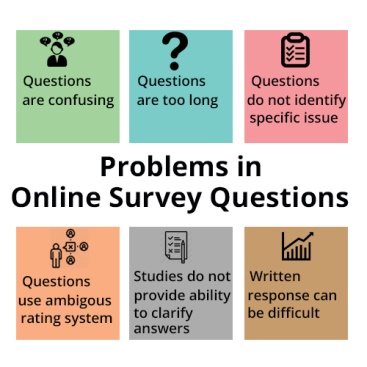What are the technical hitches in online survey questions? How to overcome those challenges?
Brief:
- Innovation is impressive; however, it doesn’t replace creating reviews that return data that will assist you with settling on great business choices.
- By distinguishing what the most well-known issues are with online reviews, you can most effectively conquer the difficulties with studies so your business can appreciate the advantages they give and Statswork to list out the challenges in online Survey questionnaire analysis
Introduction:
Have you ever seen that innovation makes a ton of undertakings more straightforward — yet it doesn’t make them secure? Online overviews resemble that as well. Twenty or thirty years prior, you needed to recruit a think-tank to do reviews. At the point when thoughts went on the web, you could cut a ton of the “cost” out; yet while having the option to direct your overviews online is less expensive than recruiting a statistical surveying firm on a superficial level. It can likewise resemble having somebody give you assembling materials and a team and having you manufacture your own home. Here are a few troubles in the Analysis of Service Quality Questionnaire.
The Questions Are Confusing or Misleading
Review questions commonly should pose a particular and pointed inquiry if you need them to yield compelling outcomes. At the point when an individual taking a review is confounded by the question, the person will regularly not answer the problem in a manner that is valuable to you. All things considered, if the respondent accepts that the question implies a specific something and you acknowledge that it means another, the reaction won’t yield any data that is dependable or reliable for your requirements for Statistics research hypothesis development.
The Questions Are Too Long
Another common issue with overviews has questions that are excessively protracted or longwinded. It is anything but difficult to lose meaning when the inquiries are too long. More than that, the respondent may feel overpowered or may even lose centre when the investigations are overly long. The best questions are those that are short, direct, and forthright. They have a particular reason, and they by and large have short answer alternatives that are straightforward. Respondents are occupied and may effortlessly get diverted. They regularly need to put in no time flat all things considered addressing questions, so they ought to have short, direct inquiries and answer alternatives that help them to feel like they are advancing through the overview with speed. A review will uncover restricted or useless data if the respondent neglects to address the entirety of the inquiries for Questionnaire Development in Research.

The Questions Do Not Identify Specific Issues or Problems
At the point when your review identifies with the advantages and disadvantages of a component or an item, you need to acquire detailed data about it. A few inquiries may pose for broad or indistinct data about the issues a purchaser may have or why a shopper picked one item over another. In any case, the data that is given by the respondents through the study may not satisfactorily characterize what the issue explicitly is or how a customer may favour the organization to address the issue for Questionnaire on Information Structure.
The Questions Use Ambiguous Rating Systems
Numerous reviews that organizations use today request purchasers to rate their encounters on a scale from one to five or one to 10. It may give an overall sign about whether a buyer feels impartial, excellent or negative about a specific region that is being addressed in the review, yet the reaction is reasonably self-assertive. For instance, a shopper that rates a part decidedly on a size of one to 10 may offer 8 when they are delighted with the experience. Yet, the person may not give a ten as a reaction due to the conviction that an organization can generally improve. Then again, a client may provide a 10 when they were not fulfilled, but since they don’t need store staff or the executives to get terminated or in a difficult situation. These are subjective assessments that depend on an individual’s worth framework or convictions. They may demonstrate a positive or negative insight. However, they don’t give any useful or genuine data for an organization to refine.
Studies Do Not Provide the Customer With the Ability to Clarify Answers
Numerous reviews ask clients inquiries with a different decision reaction alternative (various decision questions), yet they don’t give the respondent the occasion to explain their answers. For instance, it might ask a customer which highlight was generally significant in the purchasing choice. However, it may not ask the shopper for what valid reason that component was substantial. There might be various reasons why a particular element might be significant in a purchasing choice, and acquiring better input from respondents is significant for organizations that need to improve items or improve their advertising message for Business research survey analysis.
Uninhibitedly Written Responses Can Be Difficult to Quantify Through Analysis
While it very well might be significant for organizations to get unreservedly composed or open-finished reactions from their intended interest group through studies, it tends to be hard to measure or investigate these reactions. For instance, one inquiry might be an open-finished reaction choice that asks the client to state for what reason they chose one item over another or to portray their experience. Generally, programming projects can be utilized to examine the reactions by getting used words in the appropriate responses. Yet, when you have hundreds or thousands of remarkable reactions, it very well may be hard to ultimately measure them in a way that is valuable to the organization in any genuine manner. It is a logical inconsistency to the way that clients should be given space to explain their reactions uninhibitedly, and it by and large implies that organizations may need to peruse every one of the responses cautiously to improve thought regarding what the clients accept or think.
Conclusion:
As should be obvious, there are various difficulties that organizations may confront when utilizing overviews, yet reviews are, in any case, helpful and significant. They can manage you in encouraging promoting choices, item advancement or refinement, client care and that are just the beginning. For the most part, the input that you get through these reviews can be utilized to give your clients a superior generally experience, and they can be used to provide the centre with and lucidity of your endeavours. Nonetheless, to achieve the objectives that you have, you should figure out how to defeat the difficulties that are regular with ill-conceived and created reviews. As you research and select an overview programming stage, consider not just how they help you make, disperse and dissect studies yet additionally how they assist you with making it robust says Stats work.
References:
- Van Selm, M., & Jankowski, N. W. (2006). Conducting online surveys. Quality and quantity, 40(3), 435-456.
- Andrews, D., Nonnecke, B., & Preece, J. (2007). Conducting research on the internet:: Online survey design, development and implementation guidelines.

 Previous Post
Previous Post Next Post
Next Post